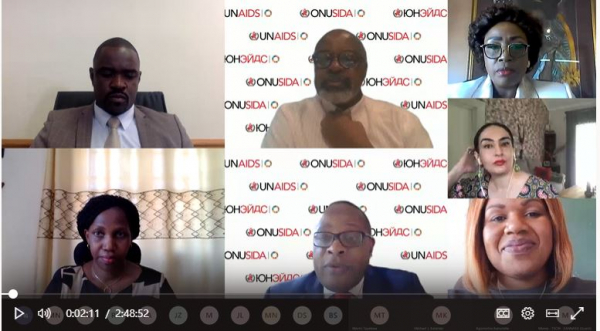As the COVID-19 pandemic continues to impact societies, governments are implementing public health measures and responses to counter its effects. Measures such as restriction of movements and lockdowns are among the recommended public health interventions to curb the spread of the virus.
However, these measures have resulted in socio-economic injustices, especially among vulnerable and marginalized communities. They usually lack social protection and face myriad legal and structural challenges in seeking services. The restriction measures have also resulted in disruption of HIV service delivery.
In response to these issues, the Southern Africa Development Community Lawyers Association (SADCLA) and the East African Law Society (EALS), in partnership with UNAIDS, convened a webinar on the impact of COVID-19 on the right to health.
The webinar highlighted the legal and structural drivers of risk among the most vulnerable, including gender inequality, discrimination and harmful practices. Participants discussed the role stakeholders can play to enhance marginalized groups’ access to appropriate assistance during the COVID-19 pandemic.
“UNAIDS is working with governments and civil society to eliminate stigma and discrimination faced by marginalized people. Human rights should be the foundation in response to inequality in society,” said Aeneas Chuma, Director for the UNAIDS Regional Support Team for Eastern and Southern Africa. Mr Chuma stressed the importance of upholding human rights during the pandemic response.
Civil society organizations in the region play an active role in promoting equality and to reverse the impacts of the pandemic. They play an active role in championing for the rights of women, girls and key populations, that is, men who have sex with men, sex workers, people who inject drugs and transgender people.
In her remarks Rouzeh Eghtessadi, Executive Director of the Southern Africa HIV and AIDS Dissemination Service, noted, “COVID-19 has expounded the deeply rooted inequalities faced by young women and girls, lesbian, gay, bisexual and transgender people, sex workers and vulnerable populations. There is need to strengthen civil society to continue advocating for their rights,” she said.
As the pandemic continues to disrupt services, the gap between the rich and the poor continues to widen and the milestones made in the recent years are at risk. An important element of inequality currently being witnessed is in the access and utilization of vaccines. Particularly there is a glaring gap between the rich and poor countries.
The People’s Vaccine Alliance is warning that developing countries are facing critical shortages of oxygen and medical supplies to cope with COVID-19 cases yet the majority have been unable to administer a single dose of a COVID-19 vaccine. In contrast rich nations have vaccinated their citizens at a rate of one person per second over the last month.
“Access to vaccines is a major challenge to developing countries, yet it is a human right to enjoy the maximum standard of health attainable,” said Sylvia Mthethwa, Pan African Parliamentarian in the Committee on Health, Labour and Social Affairs.
In most cases, the services have become unavailable or redistributed to meet health needs caused by the COVID-19 pandemic. As noted by Bernard Oundo, President of EALS, this has left majority poor people at a further disadvantage. “The pandemic has ravaged our economies, disabled healthcare systems and thrown marginalized and vulnerable communities into further disadvantage,” he said.
Healthcare service delivery in the region has also been impacted resulting into further inequalities particularly considering the majority poor who depend on the public health services.
“COVID-19 has widened the gap between the poor and rich, reduced the gains made in the fight against the gender gap between men and women, and increased mental health problems,” said Vimbai Nyemba of the SADC Lawyers’ Association.
Abigail Noko, Regional Director for the Office of the United Nations High Commissioner for Human Rights said we must ensure equality and remove the structural and legal barriers and governments must ensure inclusion of key populations in their policy processes.
The webinar called for a need for collaborative regional work to remove the barriers faced by key populations in the region.

